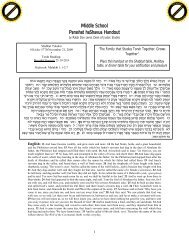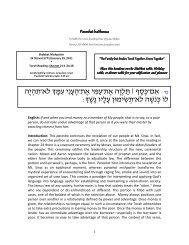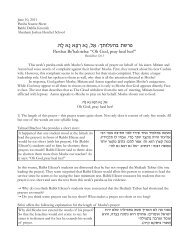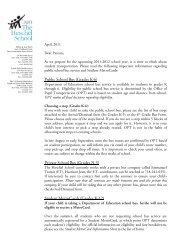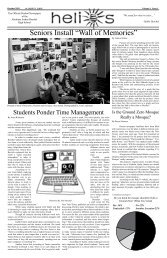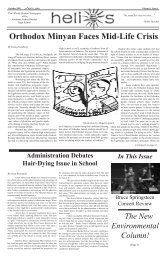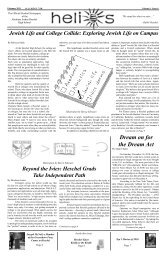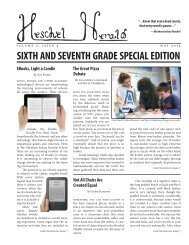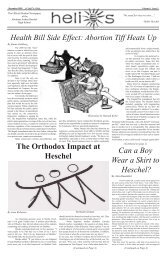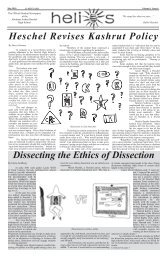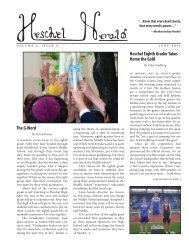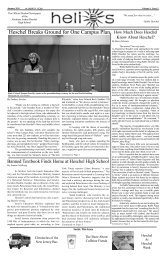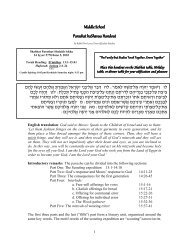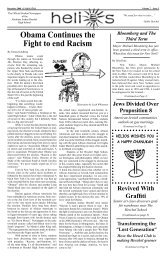Volume 8 Issue 4, February 2010 - The Heschel School
Volume 8 Issue 4, February 2010 - The Heschel School
Volume 8 Issue 4, February 2010 - The Heschel School
Create successful ePaper yourself
Turn your PDF publications into a flip-book with our unique Google optimized e-Paper software.
Page 2 Helios <strong>Volume</strong> 8 <strong>Issue</strong> 4 <strong>February</strong> <strong>2010</strong><br />
<strong>The</strong> Pluralistic Paradox: Coming Out in<br />
<strong>Heschel</strong> High <strong>School</strong><br />
By Emma Goldberg<br />
Emmy Tauber, a sophomore at <strong>Heschel</strong><br />
High <strong>School</strong>, came out in her freshman<br />
year. At first she enjoyed support from close<br />
friends when she disclosed her homosexuality,<br />
but as the news spread, reactions began to<br />
vary. Tauber is the first <strong>Heschel</strong> student to come<br />
out as gay while still attending the high school.<br />
When she first came out in the winter of last<br />
year, she told her two closest friends and family,<br />
but the news soon spread.<br />
Tauber felt that many in the community, while<br />
not openly hostile, were not very accepting.<br />
“People have felt uncomfortable when I talk<br />
about anything related to homosexuality at<br />
<strong>Heschel</strong>,” Tauber explained. <strong>The</strong> fact that the<br />
reception she received was so mixed may be<br />
a reflection of a paradox within the <strong>Heschel</strong><br />
community. Although the <strong>Heschel</strong> community<br />
prides itself on pluralism, its acceptance of homosexual<br />
students is ambivalent, according to<br />
Tauber.<br />
When asked what behavior caused<br />
her to feel so excluded as an openly gay student,<br />
Tauber cited the fact that<br />
many <strong>Heschel</strong> students are<br />
not sensitive to the impact<br />
of language. Phrases like<br />
“that’s so gay” and “no<br />
homo” are often tossed casually<br />
around the <strong>Heschel</strong><br />
hallways, justified with<br />
responses such as, “well,<br />
I obviously didn’t mean it<br />
that way.” Many students<br />
confess that they often<br />
casually use the phrase,<br />
“that’s so gay”, and that<br />
they hear it used often as<br />
well. “I hear it all the time<br />
in completely random<br />
contexts,” said a sophomore<br />
who asked to remain<br />
anonymous. “When<br />
I hear people respond to<br />
a song or movie with the<br />
comment, ‘that’s so gay’<br />
I always call them out on<br />
it and say, ‘Wait, so you<br />
think gay means stupid?’”<br />
Another approach offered by a student<br />
was the response, “How would you feel if<br />
someone said, ‘that’s so Jewish’?”<br />
Tauber stated that phrases such as<br />
“no homo” make her feel uncomfortable because,<br />
even if they are not intended to be hurtful,<br />
their connotations suggest homophobia and<br />
exclusion. “Ask any sophomore, I am the chief<br />
policewoman at <strong>Heschel</strong> on homophobic language,”<br />
she said. Tauber stated that on average<br />
she hears between two and five homophobic<br />
remarks a day in the <strong>Heschel</strong> hallways. “Many<br />
times I try to stop them [other students using insensitive<br />
language] but they never listen. <strong>The</strong>y<br />
either completely ignore me or tell me… it’s<br />
not important.”<br />
Two years ago, the <strong>Heschel</strong> Shabbaton<br />
theme was, “words that hurt and words<br />
that heal.” It focused on inspiring students to<br />
speak more sensitively, bearing in mind that<br />
their choice of language affects everyone surrounding<br />
them. Students explored phrases such<br />
as “that’s so gay,” which target homosexuals,<br />
as well as words such as “retard,” which offend<br />
those who are mentally challenged. Seniors and<br />
juniors who experienced the Shabbaton called<br />
it highly effective. Several said it inspired them<br />
to speak more sensitively and to be aware that<br />
their language could hurt those around them<br />
even if it was not intended to be derogatory.<br />
In Tauber’s view, <strong>Heschel</strong> is due for another<br />
“words that hurt” session. Tauber added that<br />
outside of the <strong>Heschel</strong> community phrases such<br />
as “no homo” are widely interpreted as homophobic—in<br />
other words, that, “I obviously<br />
didn’t mean it!” doesn’t stand as an adequate<br />
excuse.<br />
In fact, just as words often translate<br />
into action, homophobic phrases have translated<br />
into violence across the nation—even<br />
towards gay teenagers. Carl Walker, an 11-<br />
year-old from Massachusetts, hanged himself<br />
in response to comments from classmates who<br />
saw him as flamboyant and feminine. Lawrence<br />
King, a 15-year-old homosexual student from<br />
California, shot and killed in 2008, has become<br />
an icon of the movement against homophobic<br />
violence towards youth.<br />
Tauber explained that violence towards homosexual<br />
teens is common across the nation, citing<br />
studies she has read. “That gives us, communities<br />
like <strong>Heschel</strong> that stand for pluralism,<br />
the obligation to really take a stand.”<br />
And yet, even within the small <strong>Heschel</strong> community,<br />
students are not always accepting of<br />
differences, especially where sexuality is concerned.<br />
According to a poll by NBC, 5% of<br />
American high school students identify as gay<br />
and 72% of high school students have friends<br />
or relatives who are gay. And yet Tauber is <strong>Heschel</strong>’s<br />
first openly gay student. Could this be<br />
due in part to an atmosphere of closed-mindedness<br />
and insensitivity that deters others from<br />
coming out?<br />
“<strong>Heschel</strong> is tolerant of homosexual students,<br />
but it’s not accepting.” said the sophomore<br />
quoted above. “<strong>The</strong>re’s a huge difference.”<br />
Limudei Qodesh teacher Ruth Satinover<br />
Fagen said that several students who<br />
graduated from <strong>Heschel</strong> High<br />
<strong>School</strong> over the past few years came out after<br />
leaving the <strong>Heschel</strong> community.<br />
<strong>Heschel</strong> is not unique in its struggle<br />
to retain pluralistic values where homosexuality<br />
is concerned, especially among Jewish institutions.<br />
Idit Klein, the executive director of<br />
an organization called Keshet that advocates<br />
for the rights of homosexual Jews across the<br />
United States, explained that, “It is common<br />
for people to immediately picture the Christian<br />
Right when discussing homophobia, to picture<br />
really egregious actions, but what is more<br />
common, especially in the Jewish community,<br />
is subtle homophobia—it’s easy for the Jewish<br />
community to let itself off the hook.”<br />
Jewish denominations struggle with<br />
a concept introduced in Leviticus, which is<br />
commonly translated as, “"[A man] shall not lie<br />
with another man as [he would] with a woman,<br />
it is an abomination.” (Leviticus 18:22).<br />
Klein, like many Jewish gay rights<br />
advocates, believes that there are “ways to<br />
work with a text and interpret it in ways that do<br />
not condemn gay rights.” Many disagree, however.<br />
<strong>The</strong> Orthodox Movement, upholding the<br />
strictest interpretation of Jewish law, does not<br />
permit the ordination of openly homosexual<br />
rabbis; the Conservative movement abandoned<br />
this policy only four years ago.<br />
“It’s a very difficult issue to reconcile,”<br />
said Moshe Goodman, a Limudei<br />
Qodesh teacher at <strong>Heschel</strong>. “I know that people<br />
are born with their sexual orientation and<br />
the idea of being celibate for life is an unrealistic<br />
idea for most people. <strong>The</strong>refore this law<br />
becomes, for many people, literally impossible<br />
to keep...For a homosexual to read in the Torah<br />
that something so essential to their life is a sin<br />
is extremely painful and I do wonder how it's<br />
possible that God could have possibly made<br />
such a cruel law.”<br />
According to a study done in 2008,<br />
98% of lesbian, gay, bisexual, or transgender<br />
(LGBT) students report being harassed, verbally<br />
or physically, because of their sexual orientation.<br />
According to the same study, 15% of<br />
high school students who dropped out of high<br />
school did so because of this harassment. Many<br />
students say that they know of this harassment<br />
but are uncertain how to react and be supportive<br />
of homosexual rights within the <strong>Heschel</strong><br />
community.<br />
According to Tauber, some students<br />
have already begun to react in a supportive<br />
way. “My friends especially those closest to<br />
me have expressed immense support for my efforts<br />
to advocate for gay rights at <strong>Heschel</strong> and<br />
it has made me feel that with a little coaxing<br />
the whole school can reform their ways and<br />
come to support all LGBT students for years to<br />
come.”<br />
Tauber said that after speaking to several sophomore<br />
advisories about her experiences with<br />
homophobia at <strong>Heschel</strong>, several student senators<br />
offered to dedicate a town meeting to this<br />
issue. Other students declared their willingness<br />
to cut the words “that’s so gay” from their vocabularies,<br />
and willingness to support Tauber<br />
in any way possible. <strong>The</strong><br />
recent establishment of<br />
a Gay Straight Alliance<br />
at the high school has<br />
added to this support as<br />
well.<br />
<strong>Heschel</strong>’s GSA began<br />
to meet weekly as of<br />
January 21st and its<br />
blurb, sent out through<br />
student conferences,<br />
explained that it will<br />
be, “creating a comfortable<br />
environment for<br />
students to congregate<br />
and converse.” Esther<br />
Lenchner, co-leader of<br />
the GSA, stated that in<br />
creating the club they<br />
hope to “spread awareness<br />
about gay-straight<br />
issues and reduce homophobia.”<br />
When asked what<br />
a student can do to support<br />
fairness for lesbian,<br />
gay, bisexual, and transgender<br />
students, Tauber<br />
provided several alternatives. She stressed that<br />
it is imperative that students cut homophobic<br />
language from their vocabularies—as Klein<br />
put it, “As long as a word you are using represents<br />
a social identity, you can’t empty it of that<br />
meaning.”<br />
In addition to paying closer attention<br />
to language, students willing to take the next<br />
step can generally raise awareness by wearing<br />
pins to support LGBT causes and participating<br />
in rallies. One freshman stated that she observes<br />
the Day of Silence each year, an annual<br />
day in May when students refrain from speaking<br />
for the entire day to symbolize the silence<br />
and exclusion of the international community<br />
where homosexuality is concerned.<br />
Klein recalled how 20 years ago,<br />
when she was in high school, she and a friend<br />
were the only two in the school who supported<br />
a bill to allow same-sex couples to adopt children.<br />
“That was in 1989, which in some ways<br />
feels like a long time ago, but, in social change<br />
years, is actually not so long,” said Klein. Her<br />
organization has worked with many Jewish<br />
high schools, training faculty to be sensitive<br />
to issues of homosexuality, and producing and<br />
screening a documentary called Hineni that tells<br />
the story of a 16-year-old girl who established a<br />
GSA in a progressive Jewish high school much<br />
like <strong>Heschel</strong>. Klein stated that, though attitudes<br />
towards homosexuality have changed over the<br />
past few decades, it has been a slow process<br />
and it is the duty of students to speak up and<br />
take action.<br />
Tauber shared her personal credo.<br />
“Ignorance is not bliss,” she declared. “Ignorance<br />
leads to hate, and hate leads to violence.”<br />
Illustration by Anna Rothstein<br />
Helios Staff<br />
2009-<strong>2010</strong><br />
Editors:<br />
Jessica Appelbaum<br />
Aliza Rosenfeld<br />
Gabriel Fisher<br />
Emma Goldberg<br />
Art and Layout Editors:<br />
Hannah Weintraub<br />
Hannah Kober<br />
Talia Niederman<br />
Sports Editor:<br />
Brandon Bell<br />
Contributing Writers:<br />
Jessica Appelbaum<br />
Brandon Bell<br />
Rebecca Cooper<br />
Jenna Doctoroff<br />
Rachel Fell<br />
Gabriel Fisher<br />
Aaron Freedman<br />
Emma Goldberg<br />
Ari Kramer<br />
Talia Kula<br />
Aaron Ladds<br />
Esther Lenchner<br />
Elizabeth Rauner<br />
Aliza Rosenfeld<br />
Mani Schlisser<br />
Luis Serota<br />
Zachary Stecker<br />
Andrew Udell<br />
Victor Weberman<br />
Rachel Zeuner<br />
Contributing Artists:<br />
Hannah Kober<br />
Rebecca Leeman<br />
Julie Maschler<br />
Talia Niederman<br />
Sigal Palley<br />
Andrew Udell<br />
Faculty and Staff:<br />
Lisa Cohen<br />
Gabe Godin<br />
Audrey Sieger<br />
Dena Schutzer<br />
We would like to formally thank<br />
Samuel Freedman. His dedication<br />
has helped us move Helios to<br />
the next level.<br />
Printing courtesy of Tri-Star<br />
Offset & Barry Goodman<br />
Send your<br />
comments<br />
to<br />
HS Newspaper on<br />
First Class.



